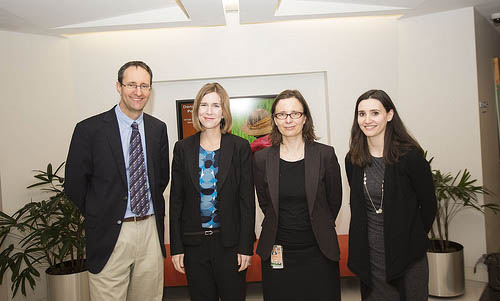Why are seemingly optimal investments and policies for reducing hunger and poverty so difficult to achieve in practice? Although scarce empirical research or insufficient technical capacity may be partially responsible, a lack of political incentives by those with the power to make decisions is often a key reason why it is so difficult to bridge the gap from research to policy reform. At a recent IFPRI policy seminar, speakers representing the research and donor communities discussed the importance of looking at ways to reduce hunger and poverty through this political economy lens.
The donor community has taken a leading role in this type of analysis. In the 1990s, donors began giving greater weight to the importance of “good governance” and gradually recognized that governance was not just an important outcome on its own but played a leading role in the overarching policy process. By the early 2000s, a few donors began launching political economy analysis, including the UK Department for International Development’s “Drivers of Change” work, the Swedish International Development Agency’s “Power Analysis,” the Netherlands’ “Strategic Governance and Corruption Analysis,” and the US Agency for International Development’s “Democracy and Governance Assessments.” These early approaches were aimed at mainstreaming political thinking within donor agencies and providing contextualized analysis of the countries in which they were working. More recently donors have moved towards a more practical approach, focusing on specific constraints to reform at the sector and project levels. The World Bank’s problem-driven analysis, which emerged during the past decade, is typical of this approach.
Verena Fritz, a Senior Public Sector Specialist with the World Bank’s Global Governance Practice and co-editor of Problem-Driven Political Economy Analysis: the World Bank’s Experience (2014), spoke about the three main components of the Bank’s approach. Fritz emphasized that political economy analysis involves more than just analyzing who are the winners and losers of reform. Instead, there needs to be equal attention to the structures (such as geography, demography, economic resources) and institutions (regulatory, legislative, and informal) in which stakeholders are operating. She emphasized that politicians face real trade-offs between long-term investments in agricultural productivity and short-term—but more visible— “stroke of the pen” reforms like subsidies. Obviously, building commitment for the former can be much more difficult.
Colin Poulton, a Reader in Development Policy at the School of Oriental and African Studies (SOAS), provided similar insights. Poulton, who leads a multi-year research program on the “Political economy of agricultural policy making in Africa” under the DfID-funded Future Agricultures Consortium, emphasized the impact of political regime type on policy preferences. Although many have speculated that overall democratization in African countries would improve incentives to respond to the rural poor, who constitute a sizeable share of voters, Poulton’s research has uncovered that urban biases persist. Moreover, even in countries with democratic regimes, policymakers have shown a propensity for rural vote-buying through fertilizer subsidies and other one-off handouts rather than more concerted investments in rural infrastructure or agricultural research and extension. By contrast, more closed political regimes in countries such as Ethiopia and Rwanda have demonstrated greater vision and prioritization within their agricultural strategies. Poulton argues in a recent article that this is because they face many internal and external threats to their rule and therefore depend on delivering growth and development to ensure their legitimacy and longevity.
One of the challenges with political economy analyses is that they are difficult to mainstream and often are limited to the domains of democracy and public sector governance specialists. However, Laura Pavlovic, the Cross-Sectoral Programs Division Chief in USAID’s Center of Excellence on Democracy, Human Rights and Governance, described an increased interest within USAID in an analytic tool that could be used by the Agency’s many bureaus for better programming and focus. In response to this demand, USAID’s new political economy tool, which is currently in a piloting phase, revolves around a set of questions aimed at uncovering the main drivers of change and their resources for facilitating or blocking reform, and works at the country, sector, and issue levels.
The seminar raised a number of key questions about political economy analysis and its utility for those working in the agricultural and food security domains. For instance: What role do donors themselves play in the political processes of developing countries? Does this analysis only work within the confines of existing political constraints, or is it also able to identify options for expanding the policy space?
Taken as a whole, the panelists made a convincing case that there are strong theoretical and empirical foundations behind political economy analysis and that it is increasingly inter-disciplinary and much more amenable to cross-sectoral learning and operationalization than in the past. The frameworks and perspectives presented offer new opportunities for IFPRI researchers to consider the political feasibility of their policy recommendations as they seek impact pathways for their work.







